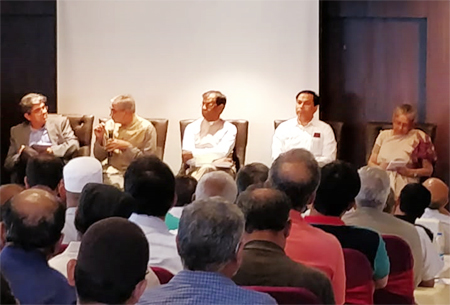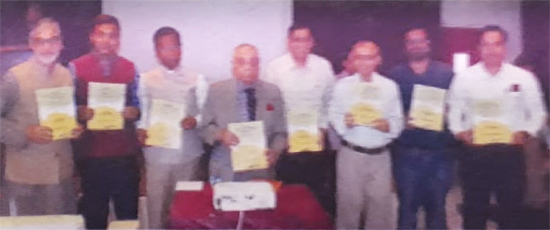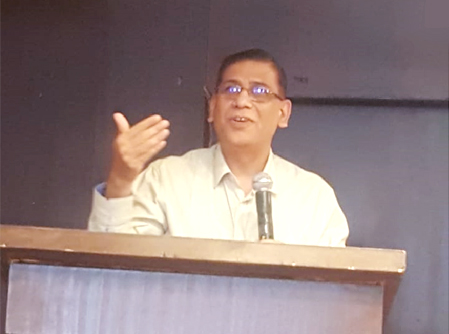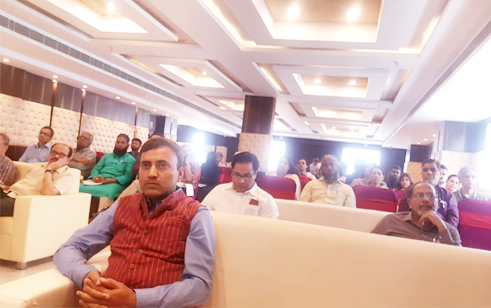IOS STUDY DOCUMENT “VISION-2025” RELEASED IN HYDERABAD
August 4, 2018 at Hotel Park Continental, Hyderabad

Hyderabad, August 4: The IOS study document “Vision-2025: Socio-economic inequalities - Why does India’s economic growth need an inclusive agenda”, edited by Amir Ullah Khan and Abdul Azim Akhtar, and published by the Institute of Objective Studies, was released here today at a gathering of intellectuals and public figures at Hotel Park Continental.
Mohammad Yameen Khan extended a warm welcome to participants in the function organised under the aegis of Institute of Objective Studies, New Delhi. The city’s elite gathered on a warm Saturday morning to discuss India's political and economic situation.
He said the meeting would not have been possible without generous support from patrons. He acknowledged continuous support from illustrious personalities like Mr AG Noorani, Mr. AK Khan (IPS), Prof. Faizan Mustafa, Prof. Sheela Prasad, Prof. Abdul Shaban and other eminent people. He extended special thanks to Mr. G. Sudhir (IAS), who released the volume.
The agenda for the conference was set with a presentation by Mr. Karthik M. on “Hate crimes and mob lynchings” in India. He provided figures to prove that the crime was mostly happening in BJP-ruled states of Jharkhand, MP, Rajasthan and Haryana. He cited figures to make the point that there was a rise in such crimes after the BJP government came to power in 2014. He called upon people to visit the India spend website for details.

Mr. A G Noorani spoke in detail on challenges for India, past present and future. He said that M A Jinnah was an able leader in pre-1936 India. Mr. Jinnah advised Muslims to concentrate on business and education. He advised against taking up small fights with non-Muslims. He singled out Muslims like Chaudhry Khaliquzzaman, Zahir D. Lari and Husain Imam, who damaged the cause of Muslims in northern India. Khaliquzzaman supported India’s stand on Kashmir, but fled to Pakistan in burqa. Mr. Jinnah chided him for betraying the cause of Muslims, he said.
Maulana Azad was not made for politics. He hated Mr. Jinnah and this led to catastrophe for Indian Muslims. “Have you heard his speech at Jama Masjid? Why is this speech extolled? What kind of speech...it was self-mourning...at best..’You cut my tounge, when I wanted to speak, you severed my hands when I wanted to raise it...’ It was a horrible speech, which was a satire on Muslims. Was it a time for that? No, they needed comfort and a daring leader, but he was a weak leader and a lame duck.I..me...myself”, Mr. Noorani observed.
Patel asked Azad, why did not you open your mouth in Lucknow? Patel was doing all sort of things and doing irreparable damage to Muslim cause...and Azad was not standing up to safeguard the interests of Muslims. Some Muslims were there like A R Kidwai, but they did not provide leadership to Muslims. Patel asked all English companies in a circular to expel Muslims and send them to Pakistan, Mr. Noorani said.
“Jawaharlal was helpless and in a minority within Congress. Rajendra Prasad was unsecular to the core like several others. What could he do? Gandhi was closer to Patel, but due to North-South divide and differences, Nehru was propped up. Gandhi did not advise Muslims to join Congress.
“Morarji Desai was communal. He said that majority of Hindus were clean hearted but the same could not be said about Muslims. He became PM.
“What were the options? If we joined Congress, we would be controlled. Some Muslims were there, but they were Muslims for namesake. Sheikh Abdullah was an able and secular leader. He controlled a communal riot in Srinagar with a hockey stick. M K Tikku was made minister. He was a judicial officer who was secular.
“During communal riots in Bihar, Muslims of Bihar met and they passed a resolution in favour of Kashmir. A convention of Muslim leaders was called, and I was also invited in Bihar in 1961. Majlis Mushawarat and a CWC meeting condemned the meeting. If you talk of Muslims, it is branded communal. But, no one brands Akalis and their brand of politics as communal.
“No leadership of Muslims. Syed Shahabuddin damaged the Muslim cause and their leadership with his approach to petty issues such as offering prayers in Safderjang Madarsa in Delhi. All predictions of Azad came true. Muslims became muhajir in Pakistan, and in India no Muslim leadership.
“Md Ismael was called Qaed-e-Millat, but Indian Muslim League did not rise beyond Kerala.
“In 1956, Jan Sangh came and Jabalpur riots happened in 1961. The riots were a result of Jan Sangh propaganda. Congress was divided. One group aligned with Jan Sangh. Indira Gandhi co-opted Muslims as a compulsion to win election and get votes. But the honeymoon did not last long. Atal Behari Vajpayee in an interview to Washington Post said she was playing a dangerous Hindu game.
There was a pact between Congress and VHP to remove the locks of Babri Masjid before 1986. Rajiv Gandhi was more communal, and under the influence of Arun Nehru positioned himself as a champion of Hindus. He also fulfilled the promise to VHP. Most researches on Babri Masjid have been done by non-Muslims like R. S. Sharma, Romila Thapar, S. Gopal.
P V Narsimha Rao was the first BJP Prime Minister, he declared.
“The NRC issue had not been raised by Maulana Badruddin Ajmal and his party. Firoz Bakht Ahmed writes in Organiser to have a dialogue with the RSS. I have given the article to Mr. Asaduddin Owaisi. He is the only man who speaks up. While I was coming from Mumbai, a businessman told me he was the only one. Others were quiet. Mr. Shahabuddin has damaged the cause. I told him talk of Muslim issues.
Talk of rights, and get along with secular Hindus and like-minded people. British foreign secretary said that he did not have papers of his grandfather. We can use his statement for the cause of NRC issue in Assam. We should contact him and make a request, he suggested.
“We should use media. Amir Ullah Khan Sahib and his team has done great work. I congratulate him and wish him all the best. His work should be appreciated and applauded.
“Muslims can initiate reforms among themselves. They can do it. Triple talaq is invalid and polygamy is also not in the spirit of the divine rules”, he concluded.

Prof. Amir Ullah Khan gave an overview of Vision 2025 and presented facts and figures to suggest that Muslims were backward on all parameters of development. He particularly stressed that education and health were the two areas in which they were lagging behind most noticeably. He cited figures about the decline in migration to cities and urbanisation among Muslims. The non-creation of jobs had affected Muslims most who were generally in unorganised sector. He provided statistics to prove that the claims of rise in Muslim population was empty rhetoric resorted to for some political designs. He underlined the need for better political representation for Muslims, which was at an all-time low.
The report was released by Mr. G. Sudhir. The panel discussion that followed involved Mr. A K Khan, Prof. Abdul Shaban, Mr. Irfan Engineer and Mrs. Sheela Prasad, and was moderated by Prof. Amir Ullah Khan.
Mr. A K Khan said that the budget allocation for education of Muslims in Telengana was Rs. 2,000 crore, which was half of the total amount spent by the Central government. He said that boarding schools in Telengana for Muslims were a model where students were doing well, and teachers were paid well, around Rs. 42,000 per month. He said that girls schools were also opened and there was much demand for this. The scheme was a hit. He also cited the example of Hyderabad as a model city, where he maintained law and order with the help of citizens and political parties.
Prof. Sheela lauded the effort of Vision 2025 in giving a direction after the Sachar Committee and Kundu Committee reports. She appreciated the work of Amir Ullah Khan and called for greater gender parity in policy making. She cited the trolls directed against women as an example of anti-woman bias.
Prof. Shaban said that Dalits in Maharashtra were disillusioned with the existing parties and they were attracted towards MIM. He said that the recent demand of Shiv Sena for 5 per cent reservation of Muslims, even if not genuine, should be welcomed. He cautioned that the demand maybe to put an end to demands by Marathas and others.
Mr. Irfan said that new laws should be made to deal with hate crimes, like lynchings, which had increased since BJP came to power at the Centre. The participants agreed that with political will even existing laws were enough to deal with such heinous crimes.

Prof. Faizan Mustafa talked about law and Constitution and how Muslim in India could claim rights. He said that the word Muslim, unlike Hindu, Sikh, Anglo-Indian, SC-ST, did not appear in the Constitution. The Constituent Assembly did not accept the wish list of Muslims, so their issues find no mention in the Constitution. There was no provision for a Minority Commission.
He said that even then Muslims could claim rights as citizens and human beings. He said that everyone was given right to life, and a dignified life. Freedom and equality could be claimed and contested with the help of good lawyers even in the case of NRC.
He said that the minorities were provided with rights and special status, but the decision of a court to decide minority at state level was strange. This way, even Hindus will claim minority status in many states. “Amir Sahib’s report says that education is important and it should be claimed”, he observed.
“We should respect the Constitution. It was wrong on part of Shahabuddin to give a call to boycott Republic Day. Or, to organise a protest against Salman Rushdie. Such issues and calls only damage the cause of Muslims”, he commented.
“I have the right to say that Shariah courts are not an alternative to judiciary, but mean to fill a gap in judiciary. We should claim our rights, and struggle for that. Article 15 prohibits discrimination. Reservation can be demanded on the basis of backwardness, and it is genuine”, he opined.
Shariat and fiqh were two different things. One should not mix it. There should be room for dialogue and ijtehad. Why have Muslims stopped it? The problem is with taqleed and often one-school following. It damages the cause. One opinion, one school should not be declared law. Rather, all schools should be referred to, Prof. Mustafa argued.
Hidayah, which was translated by the British, should not be treated as divine law. Law is human and it should be treated likewise. Law can be made compatible with the Constitution with dialogue. Nothing wrong in it. Muslims should start a dialogue and not treat sources as law, Prof. Mustafa concluded.

A vote of thanks was proposed by Syed Mushtaq, who placed on record a deep appreciation to all in the audience for their support and enthusiasm. He said the organisers could successfully complete the agenda because of everyone’s presence and help. He thanked all speakers, esteemed guests and everyone in the organising team who helped at various stages of preparation for the conference. He especially thanked the team at Hotel Park Continental, members of the Access Foundation and various stakeholders who attended the meeting.
(Opinions expressed at the meet do not necessarily coincide with those of IOS.)
|